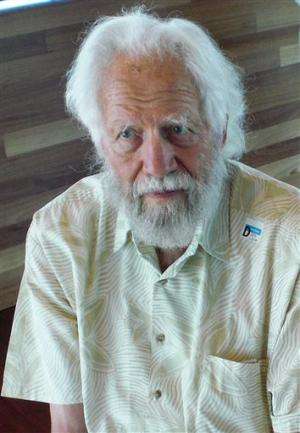Ecstasy chemist Shulgin, 88, dies in California (Update)

Alexander Shulgin, a respected chemist famed for dusting off a decades-old recipe for the psychedelic drug ecstasy, died Monday at his Northern California home. He was 88.
Shulgin's wife, Ann, said liver cancer was the cause. She said he had been diagnosed about a year ago and was surrounded by family and friends when he died at "the farm," his sprawling residence and lab in a remote part of Lafayette, California, about 22 miles (35 kilometers) east of San Francisco.
Shulgin created more than 200 chemical compounds for use in psychotherapy, and tested them on himself, his wife and a small group of friends and others at his home, recording each experience in lab notebooks. He didn't invent MDMA, better known as ecstasy, but rediscovered the compound created in 1912 some 65 years later and introduced it as a possible mental health treatment. He and his wife published two seminal books on chemical compounds.
Shulgin said he was interested only in MDMA's potential use in therapy and was unhappy to see its abuse as a recreational drug.
Shulgin was born in Berkeley, California, and dropped out of Harvard University to serve in the U.S. Navy during World War II. He later earned a doctorate in biochemistry at the University of California, Berkeley, and worked for Dow Chemical Co. for many years. At Dow, Shulgin created several top-selling biodegradable pesticides, and the company allowed him to open a personal laboratory and pursue research of his choosing. He chose to explore psychoactive compounds.
He left Dow in 1965 and began teaching at universities around the San Francisco Bay Area while continuing to research psychoactive compounds. His wife said he was introduced to MDMA in 1976 and worked out a way to easily synthesize the compound. Ann, a "lay" psychologist, helped explore MDMA's use in therapy.
"He was the scientist and I was the psychologist," Ann said of their 35-year partnership. "He was a genius."
Students and teachers made pilgrimages to his residence throughout the last 40 years.
"He was really quite a prolific chemist," said Dr. Patil Armenian, an emergency room doctor and a toxicology researcher who visited Shulgin's home four times. "Everybody in the toxicology community respects him."
The first time Armenian visited Shulgin about four years ago she needed help with a toddler who was acting strangely and was thought to have ingested one of the compounds made by him.
The last time Armenian visited was in August, Shulgin was suffering from dementia and she had to introduce herself even though he was previously familiar with her.
"And he still knew his chemical structures," Armenian said.
Armenian said that researchers are slowly renewing study of MDMA after it fell into ill-repute several years ago because of abuse as a recreational drug. The federal government reported that emergency room visits from those who took the drug increased from 4,500 to more than 10,000 between 2005 and 2011.
A memorial for Shulgin is being planned.
© 2014 The Associated Press. All rights reserved.


















